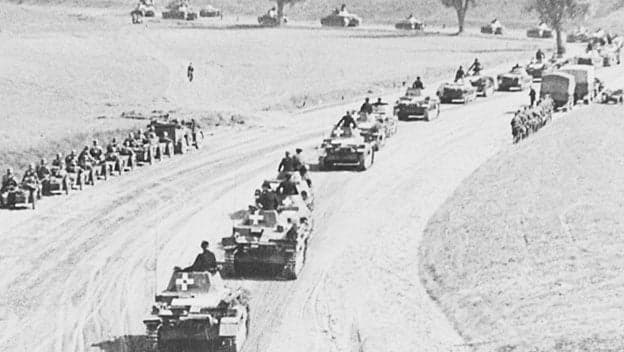On September 1, 1939, German forces under the control of Adolf Hitler bombard Poland on land and from the air. World War II had begun.
Why did Germany invade Poland?
Germany invaded Poland to regain lost territory and ultimately rule their neighbor to the east. The German invasion of Poland was a primer on how Hitler intended to wage war–what would become the “blitzkrieg” strategy.
Germany's blitzkrieg approach was characterized by extensive bombing early on to destroy the enemy’s air capacity, railroads, communication lines and munitions dumps, followed by a massive land invasion with overwhelming numbers of troops, tanks and artillery. After the German forces had plowed their way through, devastating a swath of territory, infantry moved in, picking off any remaining resistance.
Once Hitler had a base of operations within the target country, he immediately began setting up “security” forces to annihilate all enemies of his Nazi ideology, whether racial, religious or political. Concentration camps for slave laborers and the extermination of civilians went hand-in-hand with German rule of a conquered nation. For example, within one day of the German invasion of Poland, Hitler was already setting up SS “Death’s Head” regiments to terrorize the populace.
Polish resistance falters
The Polish army made several severe strategic miscalculations early on. Although 1 million strong, the Polish forces were severely under-equipped and attempted to take the Germans head-on, rather than falling back to more natural defensive positions.
The outmoded thinking of the Polish commanders coupled with the antiquated state of its military were simply no match for the overwhelming and modern-mechanized German forces. And, of course, any hope the Poles might have had of a Soviet counter-response was dashed with the signing of the Ribbentrop-Molotov Nonaggression Pact.
Great Britain would respond with bombing raids over Germany three days later.
READ MORE: How Germany's Invasion of Poland Kicked Off WWII

